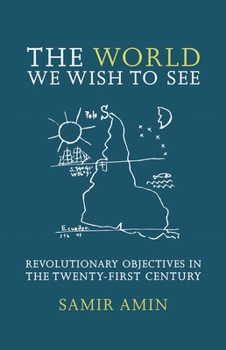The World We Wish to See: Revolutionary Objectives in the Twenty-First Century
Select Format
Select Condition 
Book Overview
The World We Wish to See presents a sweeping view of twentieth-century political history and a stirring appeal to take political organization seriously. Amin offers provocative analysis of contemporary resistance to neoliberalism, while boldly calling for a new global movement, "an internationalism of peoples," to challenge the current order and fashion a better world. Throughout the last century, great revolutions, the socialist and communist internationals, and national liberation movements presented a serious challenge to global capital. Neoliberalism and the U.S. drive for military hegemony have given birth to new political and social movements and new attempts at international organization, such as the World Social Forum. Amin maps these oppositional formations, new and old, critically assessing their potential and limitations for the revolutionary project today. The World We Wish to See draws a distinction between "political cultures of conflict" and "political cultures of consensus." Amin explains that effective opposition must be based in a "convergence in diversity" of the world's oppressed and exploited-workers, students, peasants and other opponents of the neoliberal order. What is required today is a new "international" with an open and flexible organizational structure to coordinate the work of oppositional movements around the globe. Included in this volume is the full text of the Bamako Appeal, described as a Communist Manifesto for our age, and Amin's provocative new essay "Political Islam in the Service of Imperialism." Amin's masterful analysis offers new ground for realizing the world we wish to see.
Format:Paperback
Language:English
ISBN:1583671714
ISBN13:9781583671719
Release Date:June 2008
Publisher:Monthly Review Press
Length:160 Pages
Weight:0.40 lbs.
Dimensions:0.4" x 5.0" x 7.5"
Customer Reviews
2 ratings
Fast Delivery
Published by Thriftbooks.com User , 15 years ago
The book is hard to understand so I hate it, but the delivery service was very fast and the book was in great condition! It was 100% New and I only paid about $11 in total.
Revolution on a World Scale
Published by Thriftbooks.com User , 16 years ago
This book is a logical continuation of previous Samir Amin's work on political economy of unequal development, imperialism and capital accumulation on a world scale. As capitalism is unequal and by its nature divided on centre and periphery the revolution is dependent on its uneven logics of development. From this point of view Amin looks at previous struggles like revolutions in Russia and China and national liberation in the Third World and contemporary struggle against neoliberalism. Amin thinks that transition towards a socialist future would take a form of a contradictory "long transition". Unfortunately Amin says little about the tactics of contemporary struggle and his approach of political culture is not sufficient for analysis. Nevertheless the work is interesting as an introduction to his thought and the problematics of political implications of unequal development under imperialism.






